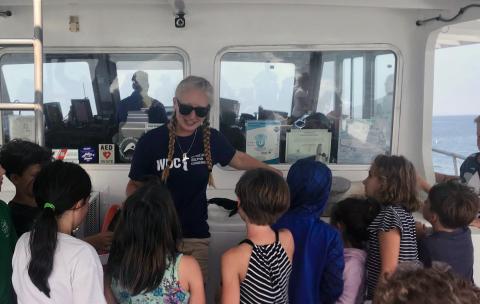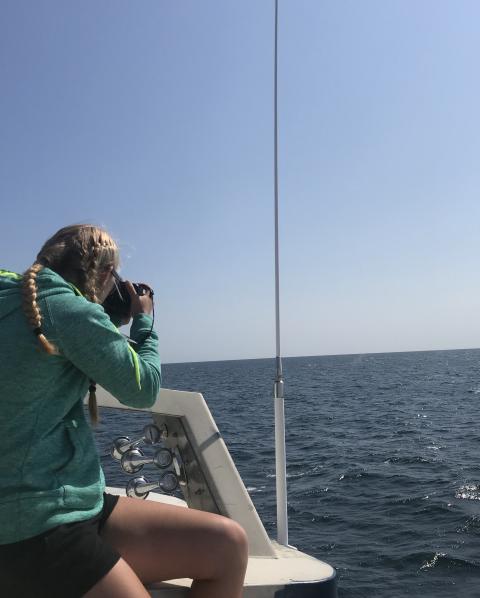
Marine, Estuarine and Freshwater Biology major Marissa Cartee ’21 relays the details of her recent summer internship at Whale and Dolphin Conservation. Embedded in her ‘tale’ is proof that experience can be powerful: not only does it build skills — it electrifies the mind and the spirit.
Marissa was able to accept the unpaid internship thanks to a stipend from COLSA’s SOAR Fund.
Marissa Cartee: I interned at Whale and Dolphin Conservation in Plymouth, Massachusetts. WDC is a non-profit organization specializing in the conservation of cetaceans around the globe. Over the summer, I worked on a variety of projects to complete this mission.
One of my responsibilities was to participate in the research that WDC does in the Gulf of Maine. I worked aboard local whale watching boats and took opportunistic data on all the organisms that we saw. Although our goal was to monitor cetaceans, I also noted any fish and debris in the water. The data collection process included taking photos and recording the location of the sighting. I processed all the photos that I took and worked to identify the individual humpback and fin whales. The data helps to monitor the population and inform policy-based decisions.

Marissa photographing whales in the Gulf of Maine. Photo credit: Marissa Cartee
The second part of my internship was focused on outreach and education. I participated in several festivals and school events where we brought our giant inflatable North Atlantic Right Whale, Delilah. During the events, we would teach people about whale anatomy and features as well as the effort to conserve this highly endangered species. The combination of both research and education provided an excellent way to learn about whales and a career in a non-profit.
Marissa: Whales have always been an animal that captured my attention. They have such gentle spirits and interesting lifestyles. For an animal that evolved on land and then returned to the sea, they not only have amazing evolutionary history, but also an abundance of behaviors that we do not understand. These questions fascinate me and led me to ask questions on our yearly family whale watch.
Whale and Dolphin Conservation was an organization that I had heard of before starting college. WDC has people who work on the whale watching boats that my family and I commonly went out on every summer. After learning about the organization from one of the interns working that year, I researched the organization and became interested in their mission and the work they are conducting. The more I learned about the policies and projects, the more I wanted to help. I volunteered for the organization over winter break and began working on some of the research they were conducting. By the end of volunteering, they invited me back for the summer internship.
Marissa: I am most proud of the dedication and hard work that I put into this internship. Over the course of twelve weeks, I worked six days a week for 8+ hours a day. The time commitment was well worth it, and there is no other way I could have imagined my summer. Every moment was a valuable learning experience, in which I felt like I was contributing to a larger goal.
During my time out on the boat collecting data, I loved being able to see the magnificent beauty of the whales. I cannot explain how much fun and satisfying it is to see these whales and then be able to identify them. The feeling is similar to solving a puzzle or a difficult problem. One of the best parts was then sharing this experience with others. Showing passengers these beautiful creatures and seeing the look of utter astonishment and adoration was one of the most rewarding experiences. In that moment, I knew that they were just curious and passionate about whales as I am.
Marissa: One of the most valuable things I learned throughout my internship is how important communication with the public is for conservation and research. On many occasions, research is not accessible to the public in an easy format where they can learn and benefit from the information. However, having this connection with the public is crucial for changing policies and making leaps in conservation. If the public does not understand what is occurring, then they cannot help.
Throughout my time at WDC, I witnessed how important educating the public is for making changes. One of the goals of the organization is sharing information with people in an easy to understand format whether it is through social media or education events. Having participated in some of the events, I got to see how best to communicate and engage with people while also refining my public speaking skills. Witnessing this process was an incredibly valuable experience and I am beyond grateful for the opportunity.
Marissa: My internship has been one of the best adventures, and I have grown so much as a person and a student. Over the course of the internship, I not only learned a lot but gained a lot of skills. My knowledge about whales and their lifestyles increased exponentially. I took advantage of every learning opportunity offered. I attended a variety of meetings and was always asking questions. The amount that I learned helped me further refine the skills that I was also developing.
One of the most crucial impacts of the internship was working on my public speaking. I have always been a little scared of public speaking, but during this internship, I conquered that fear. By the end of the internship, I found that I really enjoyed talking to people and sharing a common passion. The more questions I received from passengers the more I learned during the process.
Another skill I learned was juggling a camera, a GPS and a data sheet all while on a moving vessel. Although this did not seem like an incredibly difficult task at first, I learned very quickly that it was. Having the boat experience and collecting data is something that I can use in the future.
In addition, I refined my critical thinking and organization skills. Processing a trip of 300+ photos involved developing a strategy to be efficient and accurate. Taking the time to go through these trips was a valuable experience and I learned about the best work strategies in the process.
Marissa: I received the SOAR scholarship. My internship at WDC was unpaid, which would have made finances for the summer very difficult. Without the scholarship, I would have tried to supplement a job in combination with my internship.
Having the scholarship allowed me to devote as much time as possible to the internship without worrying about gas money or paying for expenses during the next semester. I am beyond grateful for the financial support and my internship would not have been the same without it.
- An internship is an amazing opportunity to explore the field that you are hoping to pursue. You get the chance to get your feet wet without devoting an entire career to it.
- Internships also help you grow. As much as taking classes provide you with information, internships provide you with hands-on and real world experience. Don’t discount having these experiences
- Don’t be afraid to apply for scholarships! They can help make your dream internship a reality
- Apply to internships regardless of whether you think you are the perfect candidate. You never know what they are looking for.
- Keep an open mind. Sometimes your favorite parts are the ones that you least expect
- Be ready to work hard and make a commitment to the internship.
Learn More